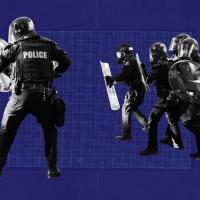As tensions between law enforcement and the public continue to rise, many are beginning to evaluate the role of the police, and specifically – whether all 911 calls warrant a visit from armed officers.
Advocates for reform say officers aren’t sufficiently trained to respond to mental health crises. They believe we should employ a new class of first responders with expertise in crisis intervention. Here’s why.
Lights and Sirens or Crisis Intervention?
In 2015, the New York City Police Department estimated that officers were called to respond to more than 400 mental health calls per day, totalling over 12,000 per month. A study conducted by the Washington Post that same year found that at least 25% of people who had been shot and killed by police officers were suffering from an acute mental illness at the time of their death.
The need for a better approach to mental health crisis intervention has never been more apparent. There are more than 42 million Americans suffering from mental health issues each year on average, and of those, statistics show that two million will be jailed.
For many suffering from a mental illness, being surrounded by sirens, lights, police, and weapons can often intensify their response and aggravate the situation. Does the criminal justice system grossly mishandle these citizens by treating them with force rather than compassion?
When police are the first responders to those suffering from a mental illness, the situation typically either ends in hospitalization or incarceration. Fortunately, there is a better way to help those suffering from mental illness get the help they need.
As U.S. law enforcement finds itself under intense scrutiny, calls for the reallocation of funding from police departments into agencies of those trained in mental health crisis intervention are sparking interest across the nation.
Memphis Changes Response to Mental Health Crises
In September of 1987, Memphis police officers responded to a 911 call leading them to Joseph DeWayne Robinson, a young man with a history of mental illness who was cutting himself with a knife and threatening to commit suicide.
While it appeared that the only life in danger was Robinson’s, the officers confronted Robinson and demanded that he drop his weapon. Robinson then ran at the officers, causing them to fire their weapons and kill him. This young man’s death led to a community outrage and a call for better mental health resources.
Robinson was a man in a crisis with a well-known history of mental illness and substance abuse. His combative response was likely due to his mental state, but rather than de-escalating the situation, the officers responded with force since it was perceived that their lives were in danger.
The outrage which followed Robinson’s death led to the creation of Memphis Police Department’s Crisis Intervention Team, or CIT. CIT became a voluntary program within the department in which officers and dispatchers could volunteer to attend 40 hours of crisis intervention training.
The program’s goals are: “to provide immediate response to and management of situations where the mentally ill are in a state of crisis; prevent, reduce, or eliminate injury to both the consumer and the responding police officer; find appropriate care for the consumer; and establish a treatment program that reduces recidivism.”
Since its inception in 1988, the Memphis CIT program has reduced use of force and restraints, decreased injuries to officers and citizens, lowered arrest rates, and decreased the need for hospitalizations from 40% to 25%. The program’s success has gained national recognition and its model is being implemented in law enforcement departments in Albuquerque, Portland, Seattle, and many others across the U.S.
Some question, though, if 40 hours of training is sufficient to adequately implement meaningful change. The CIT model relies on police officers responding to individuals in mental health crises, but other areas across the country are taking it a step further by employing professional teams of first responders with advanced training in crisis intervention.
Dallas Begins Comprehensive Emergency Response Program
In 2018, the Dallas Police Department partnered with the Dallas Fire-Rescue Department, the Meadows Mental Health Policy Institute, and Parkland Health and Hospital System to launch a comprehensive emergency response program using a model known as “co-response.” RIGHT Care, or the Rapid Integrated Group Healthcare Team, coordinates between the above agencies to provide the proper and necessary response to each emergency call.
Dallas Fire-Rescue’s Medical Director, Dr. Marshal Isaacs, explains, “If we can better serve individuals who are having behavioral health challenges outside of an ambulance, without the use of police cars, jails, courts, or hospital emergency departments, then the community as a whole has succeeded.”
The program places social workers inside the dispatch center and sends out specialized teams staffed with a mental health professional to respond to any 911 call involving a mental health crisis. The still-new program targeted the South Central Dallas area, as that is the area with the highest concentration of mental health related calls. In that area, the number of patients brought to the ER has dropped by 20% and the rate of incarceration has dropped drastically too.
CAHOOTS’ Crisis Intervention Model Thrives in Eugene
In Eugene, Oregon, a non-profit organization called CAHOOTS (Crisis Assistance Helping out on the Streets) responds to mental health crises by sending a two-person team, consisting of a medic and a crisis worker. CAHOOTS, which has been in operation for 30 years, has had so much success in the area that its model is being replicated in other states.
Denver’s similar STAR (Support Team Assisted Response) program launched earlier this year. Executive director of the local Caring for Denver Foundation, Lorez Meinhold, describes, “STAR Response works for a whole set of people where law enforcement response is not needed. 50% of people in our jails right now have at least one or two diagnosed mental health conditions. Jail is not the answer and, in fact, sets people back even further.”
CAHOOTS’ model has also proven to be a wise investment. The program estimates that it has saved local police $6 million in the costs of medical services alone. But surprisingly, its small budget, $1.8 million in 2018, is a fraction of the local police budget of $68 million, despite the fact that CAHOOTS now responds to almost 20% of the area’s emergency calls.
A Change.org petition has already received nearly 15,000 signatures calling to defund the Eugene Police Department and reallocate a significant portion of funding into the CAHOOTS program.
Reimagining the Role of Police
The American police force has long been a catch-all for all forms of crisis intervention, but programs like these demonstrate how, with trained behavioral health professionals acting as first responders, cities can better support their citizens.
While it may seem radical to institute sweeping change that removes some of the traditional responsibilities of the police force, these changes should be evaluated through the lens of progress. Up until the 1950s, the police were often called upon to be the first responders to medical emergencies, before the creation and implementation of EMT services.
It’s possible that one day, we will look back on the implementation of solutions like RIGHT Care and CAHOOTS not as the end of America’s police force, but as a significant and necessary step in providing all citizens with effective care.
Director’s Note: Janet van der Laak passed away unexpectedly, four weeks after doing this interview. She is remembered as a mother, wife, and passionate advocate for her son and others. Here are a few organizations that support people like Janet’s son, Matthew:
For more interesting news about the people and ideas that are changing our world, subscribe to Freethink.


